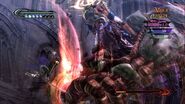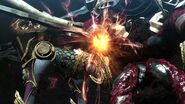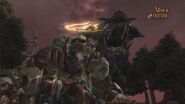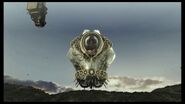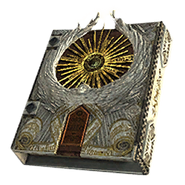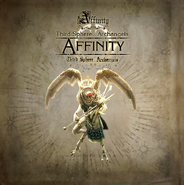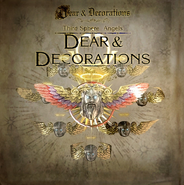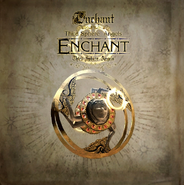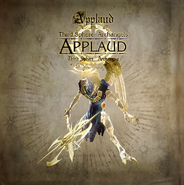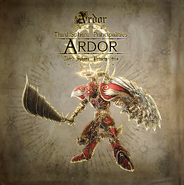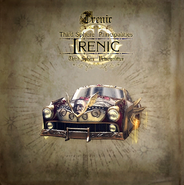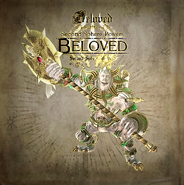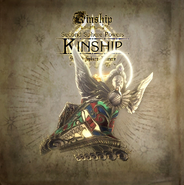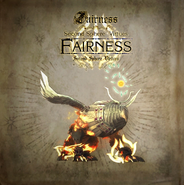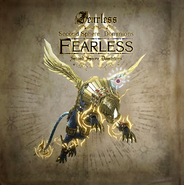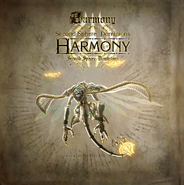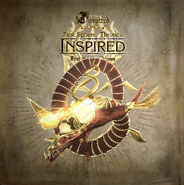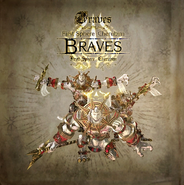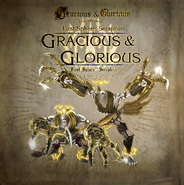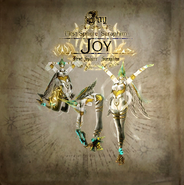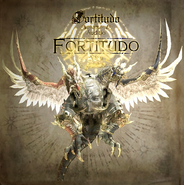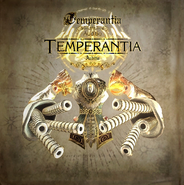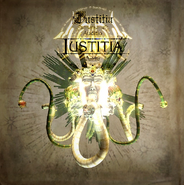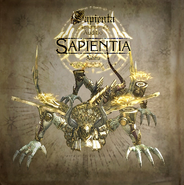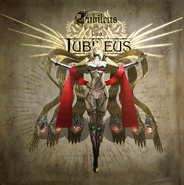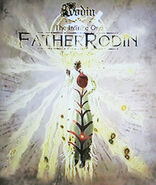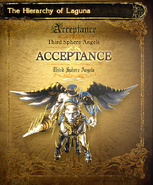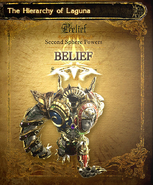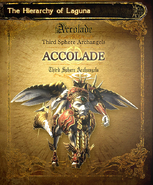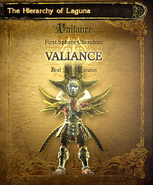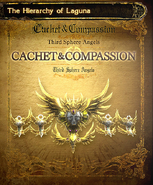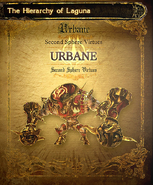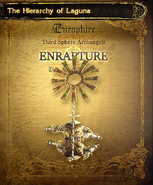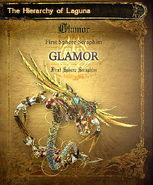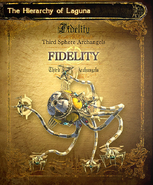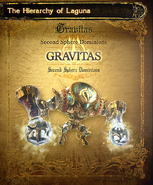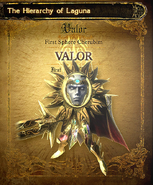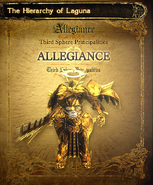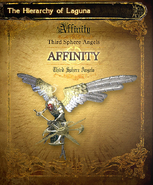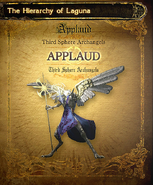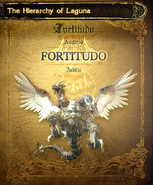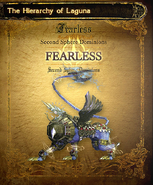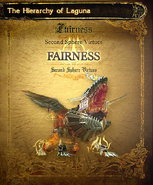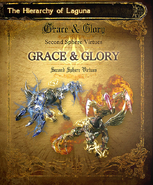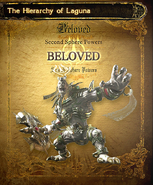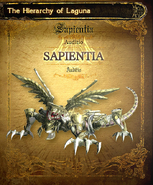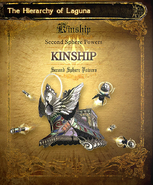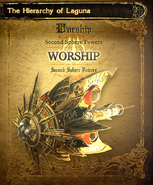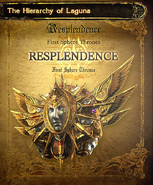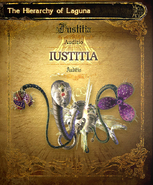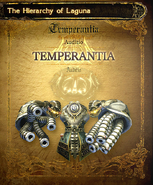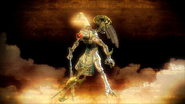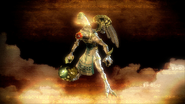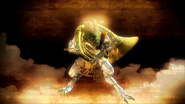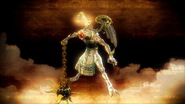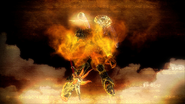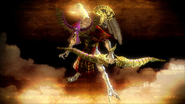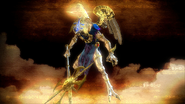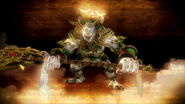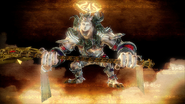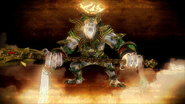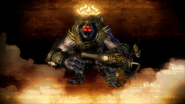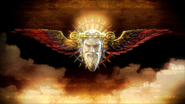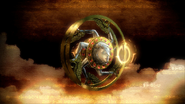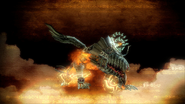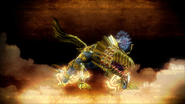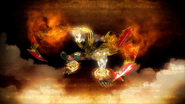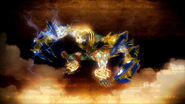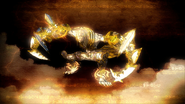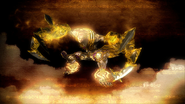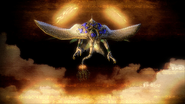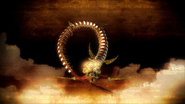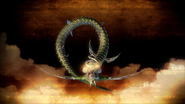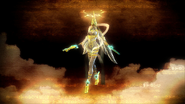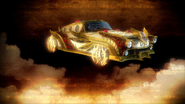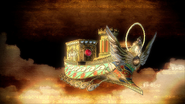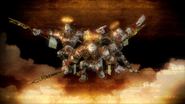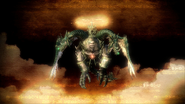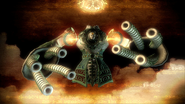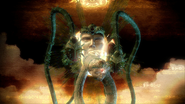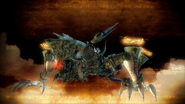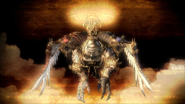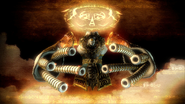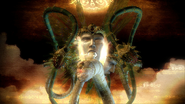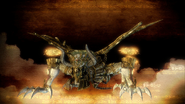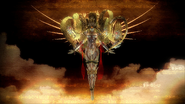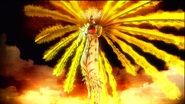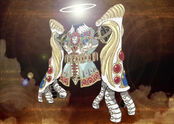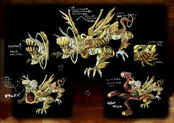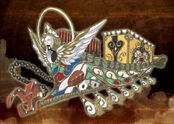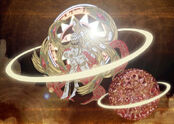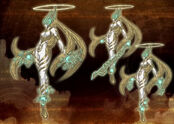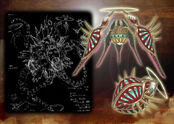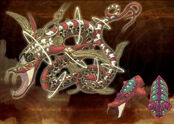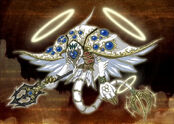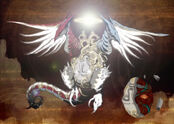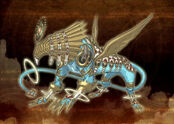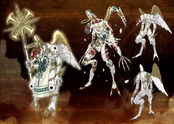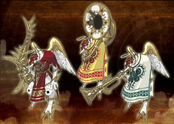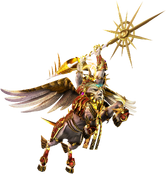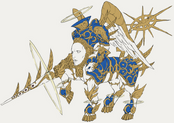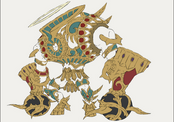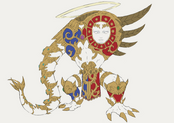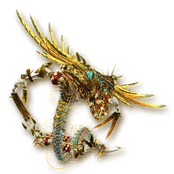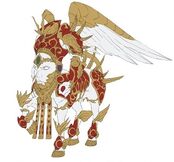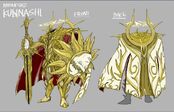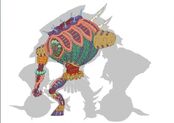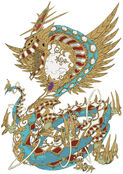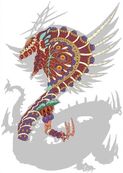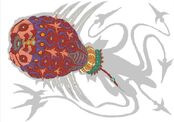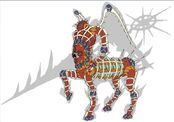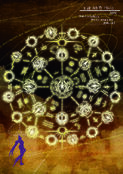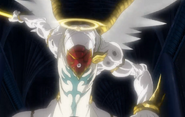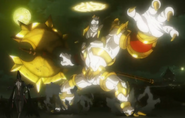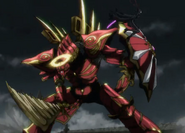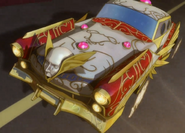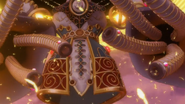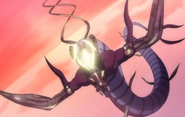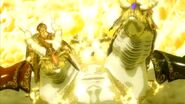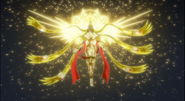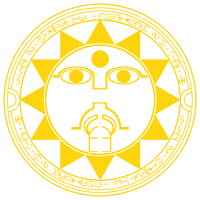
Hierarchy of Laguna's Symbol. Outlined in Enochian, "Heaven's radiance outshines all"
The Angels of Paradiso, in particular the Hierarchy of Laguna, are the heavenly inhabitants of Paradiso and the primary antagonists of the Bayonetta game series. The Angels are closely affiliated with the Lumen Sages, battling alongside them during the Clan Wars, and can be summoned by Sages such as Balder in combat hundreds of years later. The Angels are collectively referred to as "Laguna" and worshiped by the people of Vigrid.
The Angels that Bayonetta encounters during Bayonetta and Bayonetta 2 games are the soldiers of Paradiso that Bayonetta hunts down.
Description[]
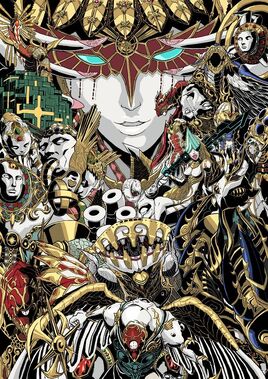
Angels of Paradiso
With forms based on depictions of holy beings, all Angels seem to share certain characteristics: marble-like skin, gold and ivory armor, and frequently extravagant golden halos made of light. The extravagance of their halo is closely affiliated to their sphere of influence within Paradiso, with lower-ranking Angels having rather simplistic halos and higher-ranking angels such as the Auditio having multiple halos, each of which can be up to several hundred feet across. Angels that are often felt or seen by humanity, such as the Affinities appear humanoid and closely resemble modern depictions of Angels, while many others, such as the Enchants frequently appear to be much more exotic, resembling wheels. Even higher ranks appear as things that are not traditionally affiliated with angels, such as ships or cars. Other Angels, such as Fearless and Fairness appear to simply be angelic beasts.
Like humans, most Angels are physical beings that are able to exist in Paradiso or Purgatorio, being able to influence the human world from either. Even if most humans perceive Angels as blurred light, the types of Angel seen in both games have physical bodies with evident biology; though the function of the biology is utterly alien when compared to earthly forms, Angels appear to have a similar dependence on internal organ structure. Massive trauma, vivisection, or beheading an angel can all lead to an Angel's destruction. To protect these inner-organs, all Angels have an external protective layer made of gold and marble. Whether this is an exoskeleton or something similar to an ornate set of armor is unknown. Despite appearing as stone and metal, the skin is readily pliable, able to bend and stretch similar to skin as the Angel moves. Some Angels, however, such as Joy, are said to have broken completely free of physical bonds. As a result, Joys are able to manipulate their physical body at will, allowing them to transform into a wide array of beings, and even mimic Bayonetta's weapons and attacks.
Similar to their infernal counterparts, angels are the source of a Lumen Sage's magic. They can be summoned by Lumen sages and use their power to perform the Light Arts; some can also enter a pact with a Lumen Sage and form a contract in order to derive incredible power and abilities (in which includes longevity).[1] However, the Lumen Sages do not require contracted angels to fight on their behalf.[2] Despite the positive feelings that most angels govern and exude, the Hierarchy of Laguna itself is single-minded and sinister. Acting as a supernatural army, the three spheres of the Hierarchy blindly follow every order given to them by superior beings, such as the Auditio, even if this means harming innocent people or acting as mere fodder against powerful enemies. This makes it difficult to judge if they are not sentient beings, deprived of free will or simply totally obedient; the lowest angelic ranks are born from the souls of self-sacrificed humans, thus hinting that the Hierarchy is tied to the human race in a way far more disturbing than mere devotion. The four Auditio are, contrarily, extremely intelligent, and cunning; even if most angels manifest basic emotions like fear, the Cardinal Virtues are prone to express contempt and anger.
Furthering their deceptive nature, many angels also appear to have human faces that are non-threatening and child-like in appearance. However, beneath these beautiful and non-threatening appearances are monstrous features such, including gaping maws or slanted-pupil eyes. This disguise may be a strange quirk of the angels themselves or, since Sapientia said outright that human beings are cowardly and unreliable and Fortitudo spoke of humans as being easily deceived, it may just be a ruse to further give the impression of caring guardians of mankind.
Spheres of Influence[]
The Hierarchy of Laguna, and much of Paradiso's apparent residents, seems to be divided into three separate "spheres", or ranks. Each of these spheres has its own sub-ranks, with lower-ranking spheres and lower sub-ranking within each sphere appearing much more commonly than the members of higher spheres. In general, many members of higher ranking spheres are much more powerful despite being fewer in number. All angels seen in both the games and the OVA belong to one of these spheres.
Third Sphere[]
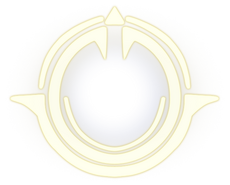
Third Sphere Halo
The third sphere is the lowest, and somewhat weakest, ranking Sphere of Influence, with many of its members making up the Hierarchy's shock troops and most of its standing army in general. They are most numerous rank, but also generally the weakest. When fought in either game they are generally the slowest and least-durable Angels. Taking a great deal of time to perform their attacks, which deal with little damage and leave them open to counter attacks. Despite their inherent weakness compared to higher ranks, their greater numbers can make them deadly, especially on higher levels or if they are supporting a much more dangerous type of angel.
Angels[]
Numerous and pitifully weak, even among the other Third Sphere Angels, members of this sub-rank are simply known as "Angels", with no further title or attributed importance, even in their name. Among the other members of Laguna they appear to be of expendable, with higher ranking Angels such as Beloved readily slaughtering them in droves if it would mean scoring a hit on Bayonetta herself. From this it can be concluded that these angels are merely cannon fodder for the standing armies of Paradiso, serving no greater purpose within its ranks.
- This rank includes:
Archangels[]
The stronger grunts of the Third Sphere Angels. Members of this sphere usually appear in pairs or threes and are frequently supported by six or more Affinities or other members of the Angel sub-rank. Compared to most higher ranks they are still quite weak, however, and higher-ranking Angels don't seem to regard them with very much importance. In combat, their larger size and a greater range of attacks makes them more dangerous than the lower Angel rank, and though they are also much more durable, they can be taken out in very much the same way with very little trouble.
Principalities[]
The strongest of the Third Sphere Angels, with some of them even being comparable to Second Sphere ranked Angels, members of the Principality sub-rank are the highest-ranking members of the Third Sphere and seem to serve as specialized shock-troops. Though they appear less frequently than the Archangels, they are usually accompanied by large numbers of Affinities, Applauds, and other Angels. Ardor, in particular, is usually seen leading a large number of angels into open combat.
- This rank includes:
Second Sphere[]
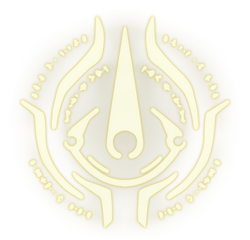
Second Sphere Halo
Appearing more rarely, Second Sphere Angels are powerful and can be dangerous to even Umbra Witches. They commonly appear with support from many Third Sphere angels, such as Affinity, but can also appear in pairs or threes. They tend to make up the numerous mini-boss encounters present across chapters of both games, usually guarding an object or impeding Bayonetta's way in some form. They are divided up into three sub-ranks.
Powers[]
Living up to their name, members of the Power sub-rank are hulking creatures that deal massive amounts of damage. Their attacks are wide-reaching and can cut a swath of destruction across the battlefield with ease. They are also physically durable, with all of them serving as mini-boss enemies and usually having their own health bar attributed to them.
Virtues[]
Extremely deadly, even in comparison to higher-ranking angels, members of the Virtue sub-rank are fast, powerful, durable, and incredibly aggressive. They are regarded as some of the most difficult enemies that can be encountered in Bayonetta. They usually appear paired with members of the Third Sphere, or in pairs, and are frequently underestimated even by expert players.
- This rank includes:
Dominions[]
The highest-ranking members of the Second Sphere. Like Virtues, members of this sub-rank are deadly and brutally powerful, though they are also the least frequently encountered of the Second Sphere Angels. Their attacks are varied, have incredible range, and are extremely fast. In comparison to their Virtue counterparts they are similarly durable, but generally, deal much more damage per hit.
First Sphere[]
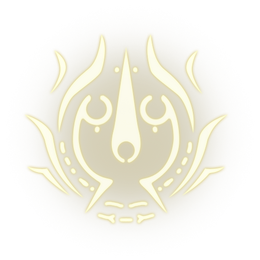
First Sphere Halo
The most powerful of the three Spheres of influence, they are fiercely powerful and durable, with some of them being able to mimic Bayonetta's style of fighting flawlessly. These beings serve as mini-bosses late into Bayonetta with some of them only appearing on harder difficulties.
Thrones[]
Members of the First Sphere. They are inhuman in appearance and serve as mini-bosses. They are very rarely encountered in numbers greater than one at a time.
- This rank includes:
Cherubim[]
Specializing more in brutal strength and direct combat, members of the Cherubim rank are deadly combatants, so much so that even though they rarely appear alongside other types of Angels, they are still some of the most difficult encounters in either game.
Seraphim[]
The members of the Seraphim rank are some of the most dangerous enemies in the game and the highest-ranking angels of the First Sphere. Gameplay-wise they are frequently attributed by players as being even more difficult than the higher ranking Auditio.
- This rank includes:
Auditio[]
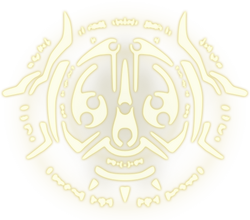
Auditio & Sequi Halo
- Main article: Auditio
Some of the highest-ranking and most powerful members of the Hierarchy of Laguna, and of Paradiso's residents in general, the Auditio are colossal in size, strength, and power. Whether they hold commanding dominion over all of Paradiso or just the forces of Laguna is unknown, however, they are certainly some of the most dangerous beings that exist within the world of Bayonetta. They are the physical embodiment of Paradiso's ideals and are regarded as living aspects of the Divine Will, which divides Paradiso's powers into one of four virtuous categories.
Sequi[]
Lesser aspects of the Divine Will. They are clone-like creatures, being weaker incarnations of the four Cardinal Virtues. As such they are much smaller and weaker than the virtue they are affiliated with, but none-the-less serve as dangerous enemies. They are all encountered after the associated Cardinal Virtue has already been destroyed by Bayonetta. This could mean that they are the weaker reincarnations of the Cardinal Virtues themselves, or that they are merely the nascent beginnings of entirely new Cardinal Virtues that have not yet grown to full power.
- This rank includes:
The Four Cardinal Virtues[]
The grand generals of the Hierarchy of Laguna, they command all other lower spheres of influence and appear to each be regarded as equals to one another. Each of them is the physical manifestation of the Divine Will's four heavenly virtues and as a result, they are some of the most powerful beings in existence. They serve as the first game's major boss encounters each time they appear.
Fortitudo[]
The "Cardinal Virtue of Fortitude" and the "Bringer of Flame". He is the first of the Cardinal Virtues that is encountered and is the physical manifestation of courage and fortitude and holds dominion over the element of fire.
Temperantia[]
The "Cardinal Virtue of Temperance" and "Manipulator of Wind". He is the second of the Cardinal Virtues that is encountered and is the physical manifestation of temperance. He is said to be the most reverent of the Auditio and he holds dominion over the element of wind.
Iustitia[]
The "Cardinal Virtue of Justice" and "Giver of Life". Iustitia is the third Cardinal Virtue that is encountered and is the physical manifestation of justice and judgment. He is said to have the most difficulty influencing the world, as the ideals of justice itself constantly change with the fickle views of mankind. He holds dominion over the element of earth and, more specifically, the life-giving nature of that earth.
Sapientia[]
The "Cardinal Virtue of Prudence" and "Controller of Seas". Sapientia is the fourth and final of the Cardinal Virtues that is encountered and is the physical manifestation of prudence. He is said the be the most narcissistic of the Auditio, displaying his power as great catastrophes such as tsunami, and by manipulating the seas into a constant swell of tides. As is readily evident, he holds dominion over the element of water.
Dea[]

Dea Halo
Meaning "Goddess" in Latin. Dea is comprised entirely of 2 beings, Jubileus and Father Rodin. God-like in power, Jubileus is a universal constant and an aspect of reality that is eternal and all-encompassing. The four Cardinal Virtues are mere manifestations of her will, and it is said that she is both the physical embodiment of Paradiso itself, and that Paradiso and its denizens are proof of her existence. She serves as the ultimate antagonist of Bayonetta and is only defeated when Bayonetta (most in the games) and Jeanne (only in the anime film) summon her infernal counterpart, Queen Sheba.
Father Rodin, revealed to be the weaponsmith Rodin, was an incredibly powerful Angel that was once charged with governing a portion of Paradiso in ancient times. He is immortal and has seen the passing of countless generations of Paradiso, earning him his title of "The Infinite One". When fought as Father Rodin he displays the same colossal and intricate winged halo as Jubileus does.
Non-Angel[]
These are enemies that are not angels but are still counted within the Hierarchy of Laguna.
- Lumen Sages
- Occult Device
- Umbra Witch
- Other
Unnamed Angels[]
These Angels make an appearance in the game, but they do not have any introductions, names, or biographies in The Hierarchy of Laguna due to their relatively small role with the humans.
The Angels (with their ranks) are:
- The missile-shaped Angels launched by Sapientia or Beloved D's bazookas. Their only attack is to fly towards the target and explode like actual missiles. Their rank is the Third Sphere, according to their halo.
- The Rocket Head Angels during the fight against Jubileus, The Creator. They attack by head-butting to their target with their face. By looking on their halo behind their body (which produces a tail of fire), their rank is the Second Sphere.
Gallery[]
Hierarchy of Laguna[]
Models[]
Artwork[]
Bayonetta: Bloody Fate[]
Trivia[]
- In terms of appearance, the Hierarchy of Laguna draws from Judeo-Christian concepts of angels as divine, but monstrous beings. Some designs like the Inspired and Enchants, draw directly from actual descriptions (in the former's case, of the Seraphim, often described as draconic or serpent-like, and the latter from the Ophanim, spinning fiery wheels).
- In Judeo-Christian religion, groups of angels are called "Choirs", 3 Choirs make a "Sphere" and there are 3 Spheres in total, like in Bayonetta games.
- It is unknown whether there are angels that are based on or perceived by the human world of Bayonetta as non-Abrahamic mythological figures (compared to demonic figures such as Baal, Hydra, etc.)
- Jubileus, Joys, and Enchants and are the only known Angels of Paradiso with a feminine design. However, only Jubileus is designated as female.
- Jeanne is the only Dark-aligned entry in the Hierarchy of Laguna. This is because she was being controlled by Father Balder, each time she is encountered and her status as an enemy boss.
- When consulting the Hierarchy of Laguna in the menu, each angel file includes a unique freeze frame along with, in front of that rank's halo symbol, the title of the angel and above and below that "___ (First, Second, Third) Sphere ___ (Individual Rank)". The Affinity angels, though simply ranked "Angels", are registered as "Third Sphere Archangels" even though that rank belongs to Applaud only. This is presumably an error.
- Though some of the higher ranked angels like the Auditio are tasked with recovering the Left Eye, it seems they are more than willing to try and kill Bayonetta in combat which would make using the Left Eye's power to revive Jubileus impossible. This is explained in Bloody Fate as a form of matyrdom, with the angels willing to sacrifice themselves to Bayonetta's powers in order to awaken Jubileus sooner.
- Harmony and Irenic are the only angels above Archangels that appear without a health bar on the bottom right of the screen. This is probably because Irenic appear only in the motorcycle scene of stage 8, where nothing has a health bar; Harmony also appear in large groups to the point where that many health bars would be confusing. Also, Harmony have relatively low health and are not mini-bosses in the game's coding.
- Kinship are the only angels that leave behind their remains after death.
- When angels are killed, they drop halos that bear a striking resemblance to the rings in the Sonic the Hedgehog series.
- Every angel in the game appears in Chapter XV: A Tower to Truth (including the enemies 'Courage,' 'Temperance,' 'Justice' and 'Prudence' who serve as weaker versions of the Auditio). The only exception to this is Irenic, as it would have been rather difficult to get a car into the building. As such, Irenic is never fought on foot.
- In Bayonetta: Bloody Fate, only seven angels make an appearance: Beloved, Irenic, Inspired, Affinities, Temperantia, Fortitudo and Ardor.
- In Bayonetta 2, despite introducing a new set of angels for much of the game, several angels from the first game make a reappearance. In the three chapters set in the past, the Witch Trials and Tag Climax, they are able to be fought against and they contain more reaction animations to match with the other enemies of the game. The Cardinal Virtues such as Fortitudo and Temperantia also make reappearances being summoned by the Masked Lumen. Dear, Enchant, Ardor, Irenic, Harmony, Joy, Braves, and Gracious & Glorious are the only Angels who do not return in the second game.
- According to Urbane's description, angels embody abstract concepts, and are implied to be born in accordance to their relevance.
- There are some angels that possess halos that are different from their ranking listed from the Hierarchy of Laguna. These angels are Irenic (listed as Third Sphere Principalities, but possesses halos from the First Sphere), Iustitia (still possesses an Auditio halo, but has Second Sphere halos on his smaller heads), and Gracious and Glorious (listed as First Sphere Seraphim, but their halos are those of the Second Sphere).
References[]
- ↑ Bayonetta Developer Commentary - BayoTV: Kamiya: (When asked how Balder and Jeanne as sages and witches retain youth and/or have longevity) They can use special powers from contracts with Inferno and Paradiso, right? They probably just always look glossy as a added bonus
- ↑ Hideki Kamiya on Twitter

